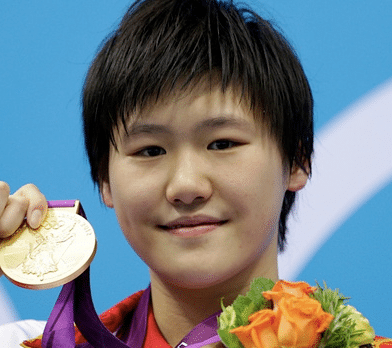A diplomatic storm was brewing last night over Olympic swimming sensation Ye Shiwen.
The Chinese 16-year-old was forced to deny using drugs after a respected US coach called her gold medal-winning performance ‘unbelievable’.
But her defiant pledge that the world record-breaking swim on Saturday – which saw her outpace the winner of the men’s event – came purely from ‘hard work and training’ failed to defuse a doping controversy gripping London 2012.

His claims came as anti-doping officials revealed that cleaners and security staff have been asked to spy on athletes in the Olympic Village and report anything suspicious that could be linked to performance-enhancing drugs.
Miss Ye’s gold medal came in the 400m individual medley, in which she swam the last 50m of the freestyle leg in 28.93 seconds – compared with the 29.1 seconds that 27-year-old American Ryan Lochte managed in the men’s event minutes earlier.
Her time for the whole event was more than five seconds better than her previous best.
Pressed on the use of drugs she told the China News Service last night: ‘There is absolutely no problem with doping. The Chinese have always had a firm policy about doping. My results come from hard work and training and I would never use any banned drugs. The Chinese people have clean hands.’
But Mr Leonard compared the final 100m swum by Miss Ye as being ‘reminiscent’ of some old East German swimmers, several of whom were subsequently exposed for using performance-enhancing drugs.
He said Miss Ye looks like Superwoman, adding: ‘Any time someone has looked like Superwoman in the history of our sport they have later been found guilty of doping.’
If someone could outpace one of the fastest male swimmers in the world and finish three-and-a-half lengths ahead of her nearest female rival, he said, ‘all those things, I think, legitimately call that swim into question’.
Mr Leonard also called for an investigation into the Chinese, saying they could be using genetic manipulation.
‘It is a result that demands an explanation – it is unprecedented,’ he said. Genetic manipulation in animals, he added, had given added strength and oxygen usage. ‘Who knows what it can do to humans?’ he added.
As a gold medal winner, Miss Ye will have been automatically drug-tested. The first four in each race are routinely tested.
Last night she continued her astonishing success by setting a new Olympic record in the semi-finals of her best event, the 200m individual medley, with a time of 2 mins 8.39 seconds.
Jonathan Harris, London 2012’s head of anti-doping, said that organisers had made security, cleaning, events services and others ‘very aware of the issue of doping, so if they were to come across practices, paraphernalia, whatever it may be, then they would bring it to our attention and, of course, we would investigate this and treat it as intelligence.’
A source close to the British swimming team, who did not want to be named, said yesterday: ‘There has been a lot of talk since Saturday about the Chinese swimmers, particularly Ye, and how they are managing to come out of nowhere and achieve these incredible times.
‘We all know about the kind of punishing regimes the Chinese swimmers are put through.’
One insight came on Sunday. After winning silver in the 100m butterfly, Chinese athlete Lu Ling said: ‘In China we’re used to study, study and train, train and then rest. I think our way of thinking has many limits. In Australia I’ve been invited to barbecues with my teammates – that would never happen in China.’
Officials say there have been 1,461 drug tests carried out so far in this Olympics – no results are yet known – and that testers can take samples at any time.
by Terence Johns

